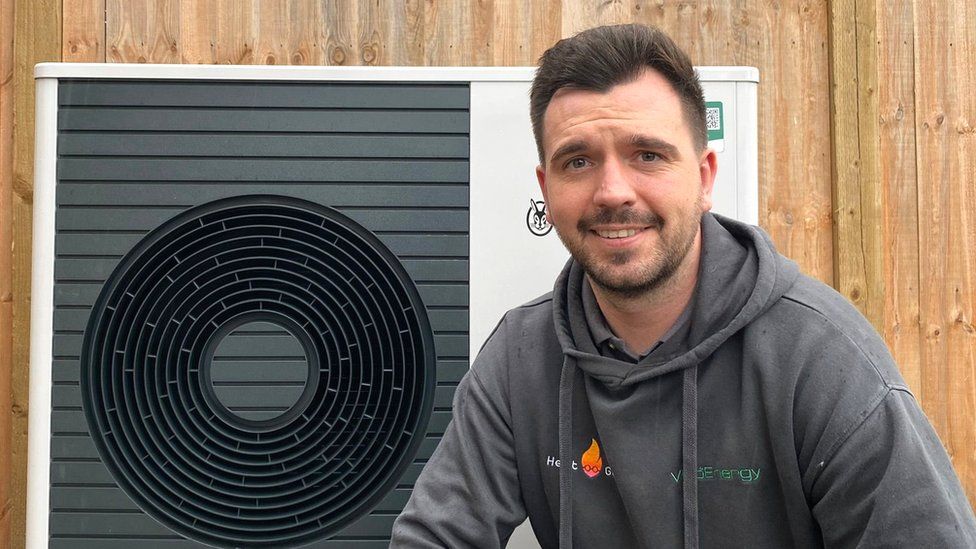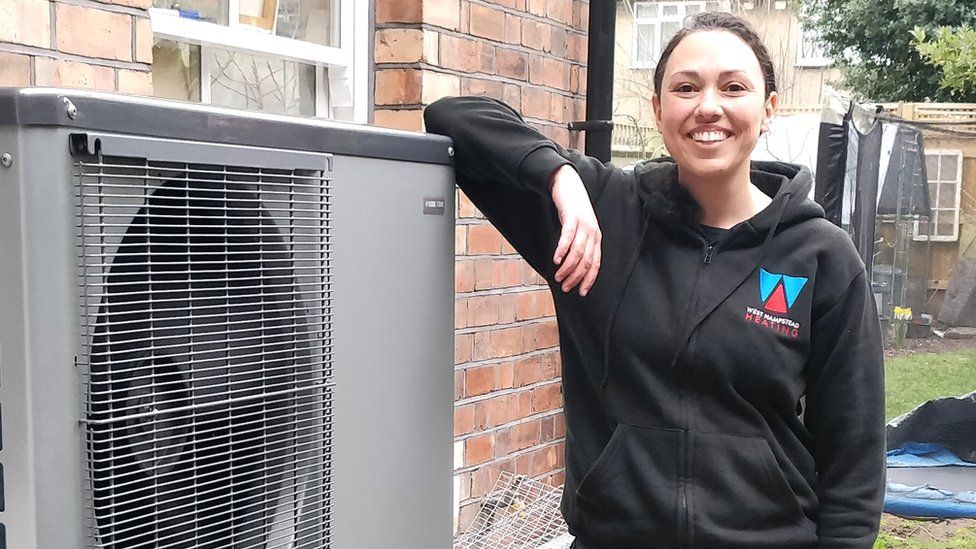‘I left teaching to train as a heat pump engineer’

He used to love teaching kids football and PE. But increasing amounts of desk work, and then Covid-19 lockdown, took the fun out of it.
So Adam Weech, who lives near Camberley in Surrey, decided to quit and retrain as a heating engineer.
He started out working with gas boilers but then stumbled on a Facebook post about VitoEnergy, a company that installs heat pumps as well as other heating systems.
He was soon hooked on the idea and is now training with VitoEnergy to become a heat pump installer, specifically.
“It’s the best move,” he says, adding, “It’s going to help the environment.”
Heat pumps that run on electricity could boost the energy efficiency of millions of British homes so long as they are fitted correctly.
Globally, the International Energy Agency estimates that heat pumps could reduce carbon emissions by 500 million tonnes by 2030.


The UK badly needs more people like Mr Weech if the country is to come anywhere near meeting the government’s target of 600,000 annual heat pump installations by 2028.
With just five years to go, the UK is achieving less than 10% of that figure and the government has faced stinging criticism over its lethargic heat pump rollout from the Lords Climate Change Committee.
Industry experts say a lack of installers is a key part of the problem.
A small army, apparently, is needed. Last July, the charity Nesta estimated that there were only 3,000 installers in the UK at the time and that at least 27,000 more would be required to meet the 2028 target – that’s if each installer puts in 22 heat pumps every year.
According to the UK Heat Pump Association, the country needs more than 50,000 additional installers by the end of the decade. The Heating and Hot Water Industry Council goes even further, estimating that 150,000 more installers are required.
“We’ve got a serious problem, we’re not attracting enough new people,” says Mr Weech’s boss, Patrick Wheeler, director of VitoEnergy, while referring to the industry as a whole.
In an effort to boost numbers, the government announced a grant of £500 earlier this month to help pay for training in heat-pump installation.
Mr Wheeler used to work with Adam Chapman at a company called Heat Geek, now a separate venture, which specializes in training heating engineers.
Heat Geek, aided by a government grant, launched a new online course at the start of the year geared towards tackling the skills shortage. 1,000 people are currently signed up to it, says Mr Chapman.
Among them is Leah El-Toukhy, an office coordinator at West Hampstead Plumbing and Heating in London. The firm sometimes receives multiple enquires per day about heat pumps.

Miss El-Toukhy does not plan to install heat pumps herself but her colleagues are already doing so, and she wants to be able to inform the firm’s customers as best as possible, emphasising that public awareness and understanding of heat pumps is still nascent.
“For me, having this information, understanding it, being able to give people the best advice […] it was pivotal, it’s so important,” she explains.
The Heat Geek course takes between 60 and 100 hours to complete and it focuses on giving trainees the skills required for designing low-temperature heating systems, ideal for heat pumps.
This means water at, for example, 40C goes to your radiators rather than water at 60C or 70C, which was common with old fossil fuel boilers.
For a low temperature system to still heat a home adequately, it must be carefully designed, explains Mr Chapman. This involves accurately calculating the heat loss from a house or flat and choosing the correct size of heat pump, for instance. Sometimes, homes might require larger radiators or additional insulation.
The technicalities are complex and not everyone acknowledges the expertise that modern heating engineers require, suggests Mr Chapman.
“It’s kind of not respected in the way it should be,” he says. “There needs to be a bit of a shift in appreciation.”
He recalls dismissing the idea of becoming a plumber himself when he was a teenager – back then, he was put off by the idea of working with toilets. He now emphasises how skilled a trade it is.

Engineering nous is crucial for a heat pump to work efficiently, argues Stephanie Willis, a data scientist at tech firm Sero, because the energy consumed by the devices can vary greatly depending on the heating demands of a property.
It’s not just that the country needs more heating engineers, then, those engineers need to really know their stuff, too.
“Doing a good job of the installation just matters much more with a heat pump than a gas boiler,” says Ms Willis.
Various other organisations are training heat pump engineers, including energy company Octopus. It currently has 250 installers and intends to scale this up by “thousands” in the coming years, according to a spokeswoman.
The Oil Firing Technical Association (Oftec) is also running a government-subsidised heat pump installation course at 19 locations in England. However, spokesman Malcolm Farrow says the subsidised training is due to end in March.
“We think the government should extend the funding throughout next year,” he says.
Mike Sammon, director of Ainsdale Gas and Heat Pumps in Southport, argues that there is still some misinformation about heat pumps perpetuated by tradespeople who are not familiar with the latest technology.
Mr Sammon completed a previous training course offered by Heat Geek in October 2021 and says that, in his opinion, “heat pumps are the future”.
But the lack of installers isn’t the only problem. Mr Sammon criticises the grant available for homeowners in England and Wales: “It often doesn’t cover half the cost,” he says.
The maximum grant available for an air source heat pump is £5,000, though bigger grants are offered in Scotland. There are currently no grants available for replacing a boiler with a heat pump in Northern Ireland.
The UK has not put in place enough policies to reach the target of 600,000 heat pump installations per year, argues Richard Hanna at Imperial College London.
“There’s no official government road map on that so it’s difficult to really take government policy seriously,” he says.
A government spokeswoman responds by saying the UK is making heat pumps “attractive and affordable” – and that industry has reacted positively to the English and Welsh upgrade scheme in its first year.
Ultimately, installers are the foot soldiers of the great British heat pump push and Mr Weech, for one, is happy to be joining up.
“I’ve got a job that I’m really proud of,” he says. “I’m not just going to work to earn money, I’m going to work and I’m learning every day.”
